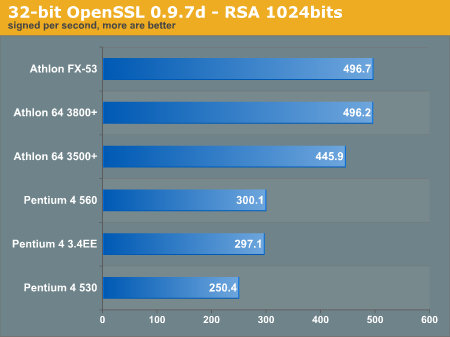Linux Desktop CPU Roundup: Cutting Edge Penguin Performance
by Kristopher Kubicki on September 19, 2004 8:00 PM EST- Posted in
- Linux
Encryption Benchmarks
Finally, our favorite part of any Linux benchmark - hashing and encryption tests. John the Ripper has multiple optimizations for Intel and AMD hardware, including hand-coded ASM functions. For the 64-bit versions of John, we compiled using the make linux-x86-64-elf target. As you can see, this produces slower binaries than the 32-bit versions of John. Oddly, the 64-bit binaries were heavily dependent on compiler flags, while the 32-bit versions showed very little difference from one compile flag to another.The Pentium 4 560 gets extremely penalized in the DES hashing, but excels in the Blowfish and MD5 benchmark. Both are still horrendously slow if you plan on using either algorithm to brute force anything, but if you tend to generate a lot of keys, you will notice a difference between the AMD and Intel CPUs.
Below, you can see how our processors performed in the OpenSSL "speed" benchmark.
OpenSSL's crypt libraries are probably heavily optimized for 64-bit operation; we see the difference in the two architectures very clearly. The RSA functionality is extremely crippled on the Pentium4 platform. Although this is an extreme example of one hardware platform dominating another, we consider this to be a relevant real world example.
An unusual problem occured while running the OpenSSL benchmark. Even though we are using Intel validated heatsink/fan combos we recieved a continuous stream of errors from the operating system regarding thermal temperatures. An example syslog can be seen below:
Message from syslogd@linux at Mon Sep 18 01:57:27 2004 ...
linux kernel: CPU#0: Temperature above threshold
This does not bode well for the processor. Our processor test bed is completely caseless, and if we have issuse with our 3.6GHz processor out of a normal case, we can't imagine what issues might exist in a full enclosure.















33 Comments
View All Comments
- Saturday, October 24, 2009 - link
sell:nike shoes$32,ed hardy(items),jean$30,handbag$35,polo shirt$13,shox$34Hugh R - Thursday, September 23, 2004 - link
Thanks for this article. It has been needed for about a year. Every previous benchmark of AMD 64 seemed to be 32-bit mode which is rather missing the point.Firefox 1.0PR on LINUX did not show the 64-bit results until I went to edit:preferences:web features:enable java advanced... and turned on lots of crap (I don't know which item made the difference).
The information was fascinating but the presentation was very awkward.
When you see a surprising benchmark result, it is a good idea to analyze why you were surprised. For example, I would guess that the poor showing for 64-bit code on John the Ripper might be due to hand-coded x86 assembly code. Note: just a guess.
The fact that Wine is only 32-bit seems pretty uninteresting/unsurprising: Win32 binaries are also only 32-bit.
Few things in the LINUX world are binary-only, so almost anything for which CPU performance matters can and should be run in 64-bit mode on a 64-bit processor.
bobbozzo - Tuesday, September 21, 2004 - link
You should be running all the compilation test with -j2 or higher, as otherwise the CPU is waiting for the disk more often.uyu - Tuesday, September 21, 2004 - link
Consider re-evaluating the test with the icc compiler:http://www.intel.com/software/products/compilers/c...
I do not think it will only favor the result of intel processors..
Zebo - Tuesday, September 21, 2004 - link
Why separate the graphs? Afriad of people easily visualizing major A64 ownage? Gawd that's hard to compare that way... I had to get out pen and paper.Shalmanese - Tuesday, September 21, 2004 - link
"throw an alternative opterating system"I like the attempt at subliminal advertising :D.
TrogdorJW - Monday, September 20, 2004 - link
On the LAME encoding benchmark, isn't the actual value really "Play time divided by encoding time"? Or perhaps "Relative encoding rate"? Anyway, the text explains the graph better (in 1 second the 64-bit FX-53 encoded 25 seconds of audio). Otherwise, good stuff.injinj - Monday, September 20, 2004 - link
Crafty does have a bit of hand tuned asm for both x86 and x86_64. Most of the operations are done with boards packed into bit representations. For example, like this:while (moves) {
to=FirstOne(moves);
*move++=temp|(to<<6)|(PcOnSq(to)<<15);
Clear(to,moves);
}
The FirstOne() function utilizes the bitscan ops of x86 (bsr = bit scan reverse), but notice the cmpl at the top:
cmpl $1, 8(%esp)
sbbl %eax, %eax
movl 8(%esp,%eax,4), %edx
bsr %edx, %ecx
jz l4
andl $32, %eax
subl $31, %ecx
subl %ecx, %eax
ret
l4: movl $64, %eax
The cmpl splits a 64 bit word into a 32 bit hi and lo words, so crafty will naturally exploit 64 bit instructions.
This same function on x86_64 can be done much fewer instructions:
asm (
" bsrq %0, %1" "\n\t"
" jnz 1f" "\n\t"
" movq $-1, %1" "\n\t"
"1: movq $63, %0" "\n\t"
" subq %1, %0" "\n\t"
: "=r&" (dummy), "=r&" (dummy2)
: "0" ((long) (word))
: "cc");
These are critical functions in crafty and if you see benchmarks comparing 64 bit crafty to 32 bit crafty, this is primarily why 64 bits is faster.
mczak - Monday, September 20, 2004 - link
what's up with the encryption benchmarks? "OpenSSL's crypt libraries are probably heavily optimized for 32-bit operation; we see the difference in the two architectures very clearly."But the results show that 64bit mode is more than two times as fast as 32bit mode in one case (RSA), and 50% faster in the other case (AES)?
(and btw I haven't looked at johntheripper, but it might contain hand-optimized assembly for x86, but only generic c code for other architectures such as x86_64.)
PrinceGaz - Monday, September 20, 2004 - link
The mouseover images work fine for me (Firefox 0.9.3)